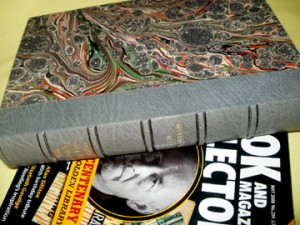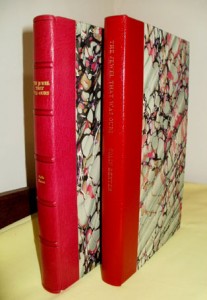 To mark 50th years since the original publication of John Fowles’ The French Lieutenant’s Woman (1969) this is a rebinding run of 12 lettered copies with additional material and the facsimile autographs of Fowles and actress Meryl Streep. These books are first editions, first impressions and are therefore scarce.
To mark 50th years since the original publication of John Fowles’ The French Lieutenant’s Woman (1969) this is a rebinding run of 12 lettered copies with additional material and the facsimile autographs of Fowles and actress Meryl Streep. These books are first editions, first impressions and are therefore scarce.
Deluxe leather binding with five raised bands, marbled patterned sides and coloured top edge. Issued with a photograph of Streep as Sarah Woodruff.
The French Lieutenant’s Woman (1969), John Fowles fourth novel, is widely regarded by collectors of modern first editions as a popular choice for one of the late twentieth century’s outstanding novels. Readers become immersed in the literary references, the historical period and detail, and are drawn to the triangular relationship between Sarah Woodruff, the femme fatale and image of a Pre-Raphaelite model, Charles Smithson the hero, and Ernestina the other woman. The literary establishment loved the book too for its intellectual brilliance: Fowles brought a modernist conjurer’s trick to his construction: producing inside the historical romance a self-conscious fabrication; where the author is in control of the literary form, reshaping its foundations.
The Victorian novel with its didactic message had, following the near collapse of the social and moral order with global events such as the Great War, the Depression and the rise of the Dictators, to adapt and adjust. Writers such as Virginia Woolf and D H Lawrence focussed on inner feelings, passion and liberal values, showing possibilities for a more open self-understanding of who we are and the changed world around us. Few modern authors have succeeded in placing a novel squarely in the period when Dickens and Hardy were the major writers – quite deliberately to investigate literary conventions, and how they worked on the socio-psychological makeup of the characters. John Fowles worked like an artist to portray an era with its conventions being eroded on all sides. We find the gentry in terminal decline, the convention, custom and tradition they stand for eroded. This shift is expressed in the novel as ambivalence about social class, morality, progress, science, religion, and of course, sex. Certainly, the problem for both the hero and heroine is how to cope with the violent passion that their society would not recognise and which its ethos could not contain.
Thought to be un-filmable it was brought to big screen twelve years after the book appeared by Karel Reisz and playwright Harold Pinter in 1981. Music by composer Carl Davis complemented the understated but energised acting of Meryl Streep and Jeremy Irons in the lead parts. It remains a favourite as both outstanding novel and film.
Ready in February 2020.














